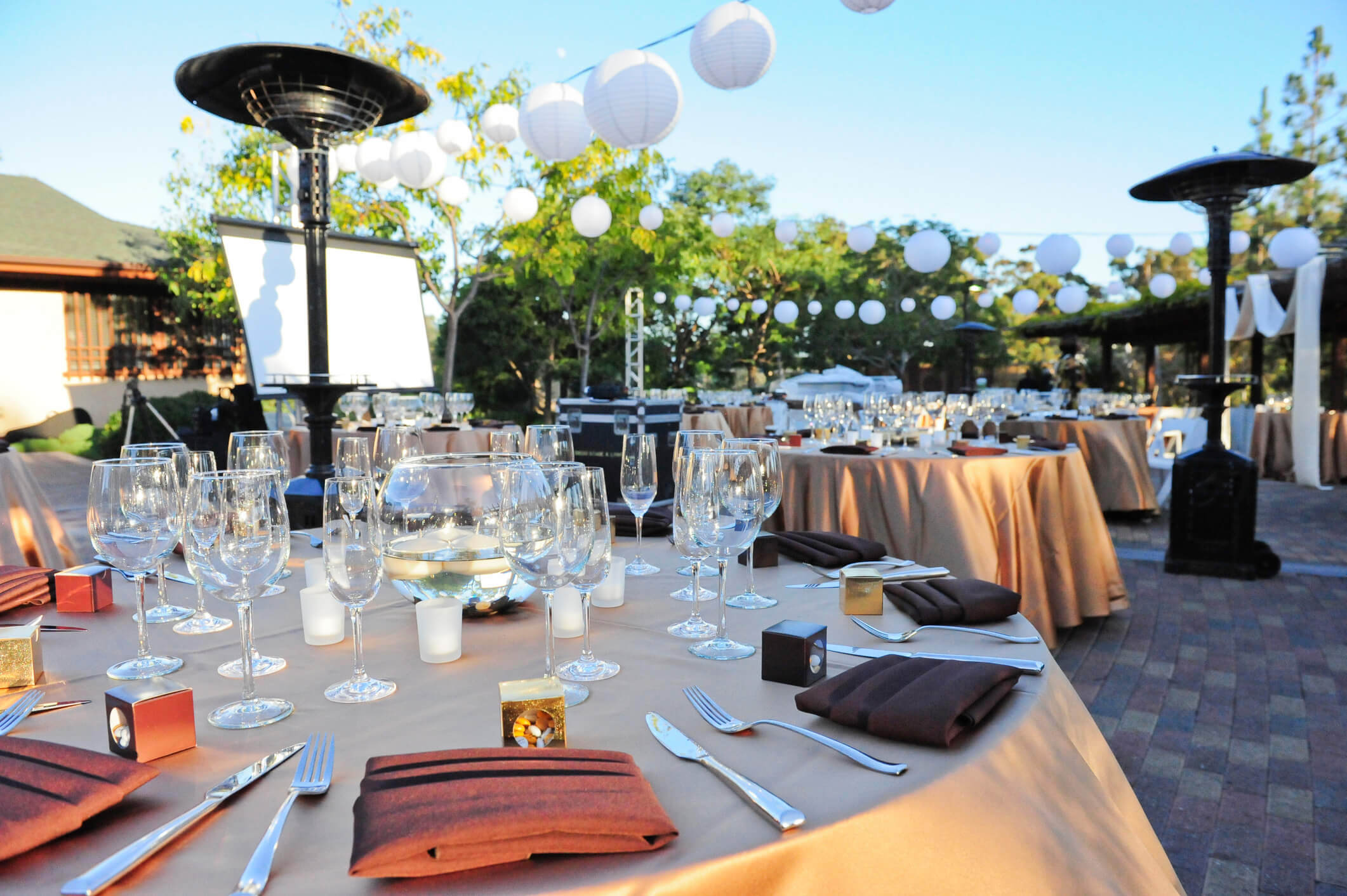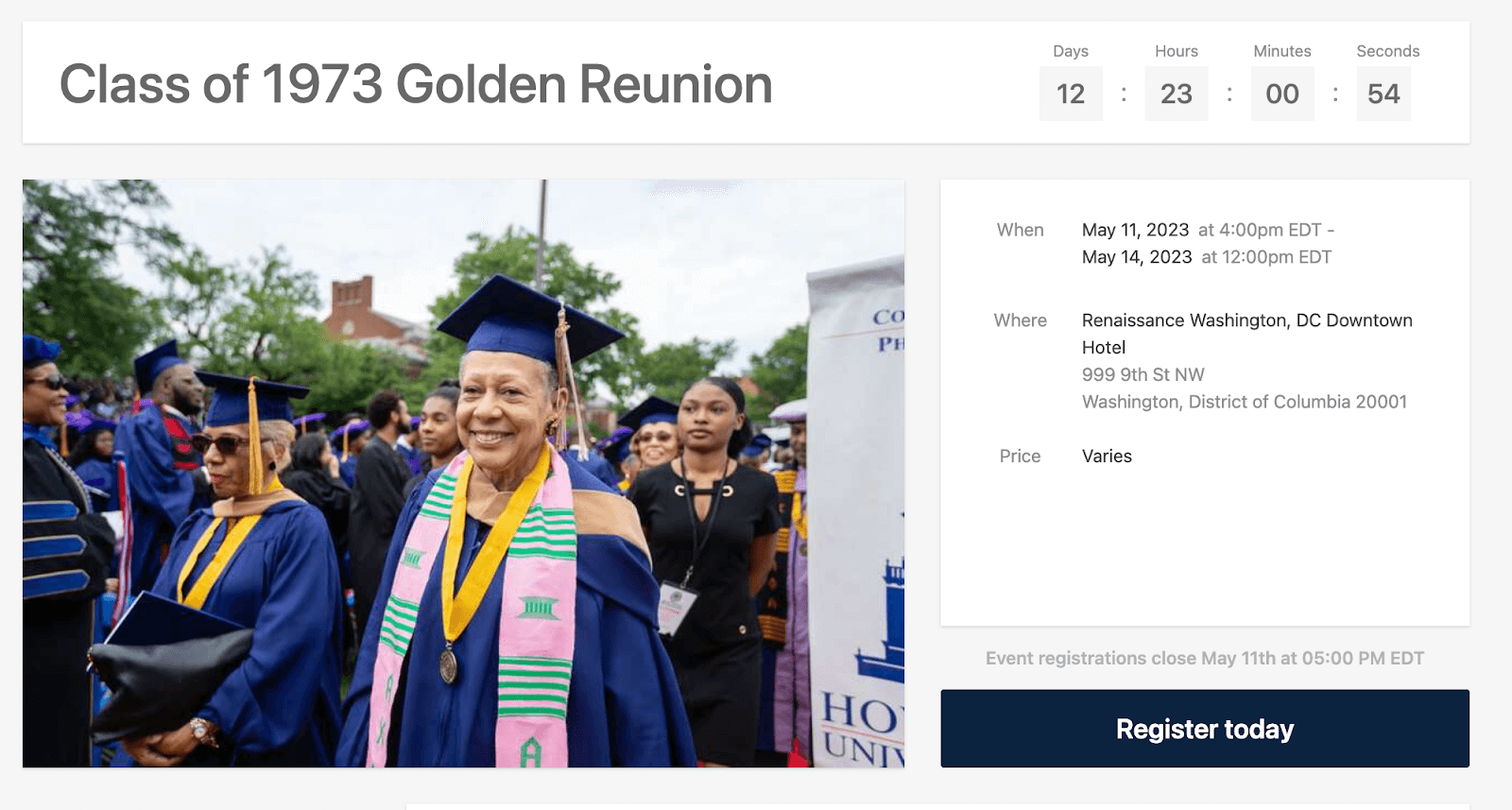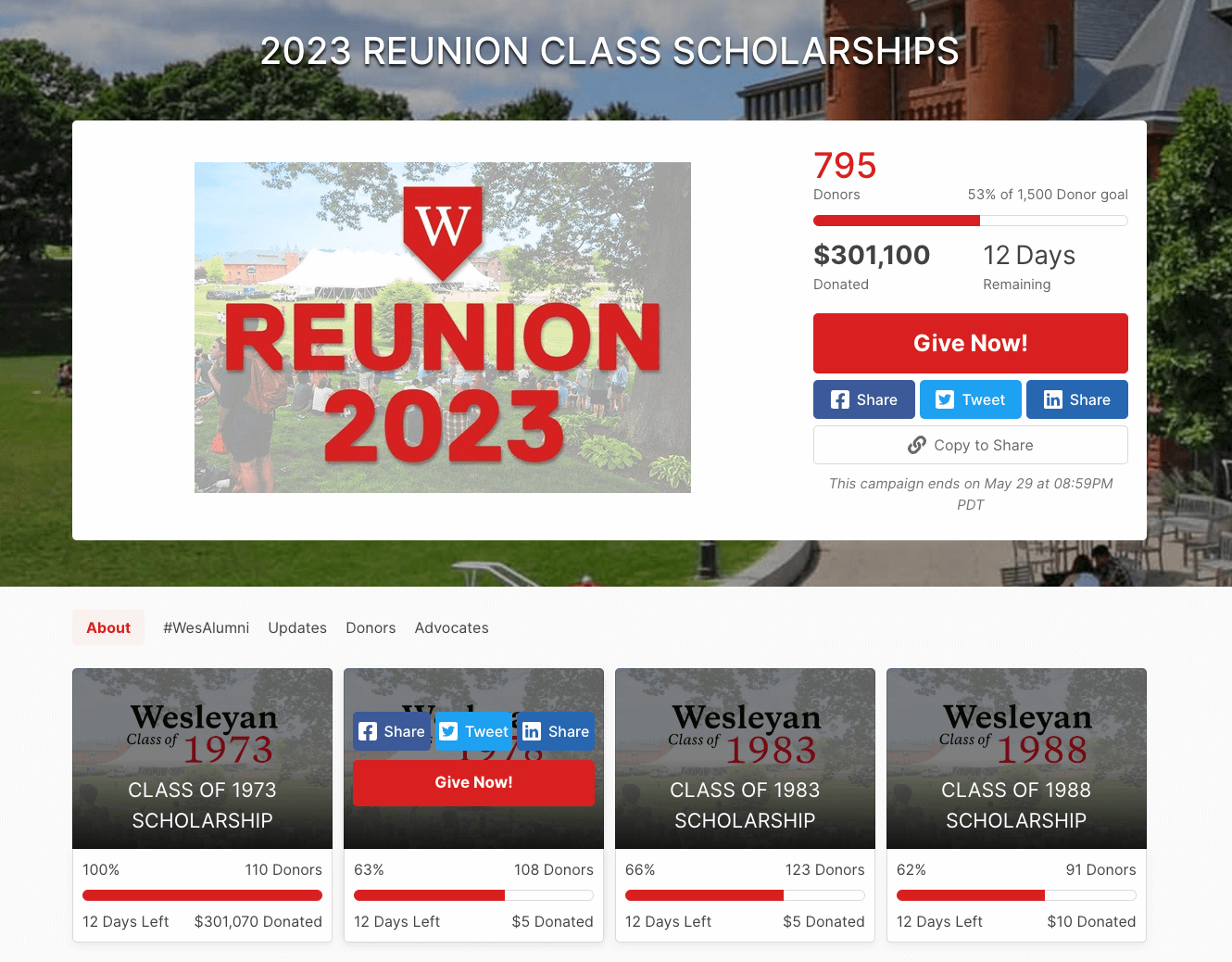Editor’s Note: This post was originally published on Map 19 2, 2023. It has been updated for accuracy and comprehensiveness.
9 Planning Tips for a Successful Class Reunion
Class reunions hold a special place in the hearts of alumni. They provide an opportunity to reconnect, reminisce, and strengthen the bonds formed during those memorable school years. They also serve as a powerful reminder of the valuable networks and support systems that can be built through a shared experience.
Class reunions not only evoke nostalgia but also play an important role in fostering alumni engagement. A reunion can be the catalyst that leads to future annual giving or even large gifts.
However, planning a successful class reunion is not without its challenges. Even the most experienced and enthusiastic event planner can feel overwhelmed by all the logistics involved in reunion planning. From selecting a venue to fundraising around the event to managing ticketing and registration, the laundry list of tasks can feel daunting.
A well-structured timeline and comprehensive checklist can help you stay organized and on top of the event from beginning to end. Whether you‘re a seasoned event organizer or a first-time reunion planner, this guide will equip you with the knowledge and tools necessary to ensure a successful class reunion.
1. Enlist Volunteers to Help
Depending on your school, you may have an entire team dedicated to alumni relations and events. Or, you may be a team of one! Regardless of your circumstances, enlisting the help of volunteers will be key to planning a successful reunion. If you work for a college or university, volunteers may include current students who are involved with the Advancement office. If you are planning a high school reunion, volunteers will likely include alumni and possibly staff members. You may choose to set up a formal planning committee for the event and establish monthly or weekly meetings with its committee members.
Volunteers can be a great help in getting the word out about the class reunion. They can help manage communications with your invitees such as sending out email invitations and texting event reminders.
Staying organized in your communication with volunteers and alumni is essential to the success of your event. Online platforms like GC Volunteer Management can help you scale your programs and track volunteer activity.
Streamline Volunteer Management with the help of a single solution:
- Communicate with your volunteers with integrated email and texting.
- Provide resources such as email templates and event pages
- Assign tasks and automatically track volunteer activity
- Review program progress and outcomes in a simple-to-navigate dashboard
Having the right tools is key to keeping volunteers engaged throughout your reunion event planning and subsequent volunteer activities.
2. Choose a Date
You’ll want to handle the key event details—like the when and where—first. This information guides much of your subsequent planning efforts. Sometimes reunions are planned around a specific anniversary of your graduation year—such as a 10-year or 50-year reunion.
While the year is often pre-determined, you need to decide on a convenient reunion date. Consider any possible conflicts such as holidays or busy times in the fundraising calendar. What time of year is best for class reunions? Popular times for reunions include early summer and late fall. After you’ve narrowed the date down to a few potential options, you may consider sending out a poll to alumni to gauge availability for each date. You’ll also want to consider if you’ll have activities on multiple days. Perhaps you’ll hold a special event—like a happy hour— for attendees who had to travel the Friday night before your main reunion event. Especially if they’re traveling far to be there, attendees will often appreciate additional opportunities to get together with their old classmates.
3. Find a Venue
Once the date is selected, you need to find a venue. Reunions typically take place in the same city as the alma mater. Depending on if you’re planning a high school reunion or college reunion, you may choose to host the event on the school grounds or find a venue offsite—such as a hotel or restaurant. Think about the number of attendees and possible vendors when selecting a space. This is when you’ll start thinking about a budget.

You’ll also want to consider factors like whether the majority of your alumni will need to travel into town to attend the event. If so, it may make more sense to pick a venue close to a variety of hotels. You might even reserve a block of hotel rooms at a preferred hotel to aid in coordinating accommodations.
4. Establish a Reunion Budget
A well-planned budget not only helps you stay organized, but it also ensures that you can execute all the desired elements of your reunion without exceeding financial constraints. Here are some steps to help you establish a realistic reunion budget.
Determine the Reunion Scope
Consider the scale of the event, the number of attendees expected, and the overall experience you wish to provide. A larger reunion at an upscale venue with elaborate activities will naturally require a higher budget. You’ll also want to think about any key elements that are non-negotiable—such as a live band or expensive reunion gifts.
Research and Estimate Costs
Conduct research around the various expenses associated with your reunion. These might include the venue, catering, entertainment, decorations, and swag. Will you have a sit-down dinner or just appetizers? Will there be an open-bar or cash bar? These decisions may seem small but can add up when it comes to reunion costs. At this point, you may begin reaching out to vendors to get quotes so you can more accurately estimate future costs.
Set a Ticket Price
One of the ways to raise money for the reunion is through ticket sales. Determining a ticket price can help you estimate how much money you’ll have in your reunion budget. Setting a lower ticket price may encourage more people to attend, so you don’t want to solely rely on tickets to fund the reunion.
5. Set up Ticketing and Event Registration
Managing ticketing and event registration is a crucial aspect of planning a class reunion. Streamlining this process ensures a seamless experience for attendees and provides you with valuable data for planning and logistics.
One of the most effective ways to manage ticketing and registration is to set up an online event page so you can begin promoting your event via email, snail mail, or social media platforms your alumni follow. The sooner you get this information sent out, the better. Knowing how many alumni rsvp’d yes can help you finalize other logistics—like the amount of food to order.
GC Events is a simple solution for managing event registration and ticketing for your events. It is simpler than building an entire reunion website and is integrated directly into the GiveCampus platform. You can easily customize your event registration page and include a public guest list that highlights the class year and affiliations of attendees and updates in real-time. GC Events also offers the flexibility to offer ticket types at different price points and allows registrants to purchase multiple ticket types in the same transaction. GC Events also offers check-in capabilities so you can manage day-of logistics all from the same platform.

GC Events also enables you to integrate donations directly into the event registration process. Encourage alumni to add a gift at checkout by linking your reunion event to a campaign or giving form. You can track gifts made from your event page while maintaining streamlined gift processing. Keep your accounting under control with custom event reports that separate donations, tickets sold, and fair market value of each ticket type.
Learn more about how to eliminate friction in the registration process with the help of a single platform.
6. Raise Money Around Your Reunion
Reunions are a perfect opportunity to raise money for your school’s annual fund or other dedicated campaigns. Alumni may feel more inclined to give back as they reminisce about their days on campus with old friends and the positive impact their alma mater had on their lives. The collective spirit among reunion attendees fosters a sense of camaraderie, making it an ideal time to prompt alumni to donate.
Check Out a GiveCampus Reunion Campaign Interactive Demo
The GiveCampus platform helps you generate more dollars and donors for your reunion giving campaigns. GC Online Giving enables the gamification of your fundraising efforts to boost visibility and engagement. Utilize tiered campaigns to inspire healthy competition among class years and campus community groups—such as sports teams and clubs. Think about what school initiatives, scholarships, or other fundraising priorities to highlight for specific alumni groups.

GC Giving Forms allow alumni to donate seamlessly by reducing friction and providing the possibility to donate with a single click. You’ll have the capability to integrate your giving campaigns directly onto your events page so alumni can donate while their school is top of mind.
The primary goal of the reunion is not to fundraise. However, a reunion provides a unique opportunity to combine nostalgia and philanthropy that shouldn’t be overlooked.
7. Book Food and Other Vendors
Once you’ve closed registration for your event and collected information about the number of attendees, it’s time to book your other vendors. These will likely include catering, entertainment, and perhaps attendee favors. Depending on how many people and volunteers you have dedicated to planning the reunion, you may have entire reunion committees dedicated to booking various vendors like an “Entertainment Committee” or “Catering Committee.”
You may also choose to provide attendees with a reunion gift such as a t-shirt or mug. You’ll want to collect any relevant information for wearable gifts during the registration process so that you have ample time to order custom items before your reunion.
8. Communicate Final Details with Attendees
When you’re a few weeks away, all of your event logistics should be in place. It’s time to touch base one more time with your attendees. Send out communications reminding them about the event date and time. Provide any helpful information such as parking or last-minute nearby hotel accommodations. You should also list all logistics and tips on your reunion event page so attendees can easily refer back to any details they may have missed. You can also send out a final pre-event push for your reunion fundraising campaigns to anyone who has yet to donate.
9. Follow Up After the Event
After the event is all said and done, you’ll likely feel a sigh of relief. But, before you bask in the glory of pulling off a successful class reunion, don’t forget to follow up with your event attendees. You can recap the event and provide links to any photo booth images or professional photography taken at the event.
This is also a great opportunity to promote your annual fund and link to relevant giving campaigns. Your alumni may feel more inclined to donate while the happy memories of their alma mater and former classmates are fresh in their minds. You may also choose to send out a post-reunion survey to gather feedback from your attendees that can help guide future class reunions you and your team may plan.
Summary
Planning a class reunion can be a daunting undertaking. But, with a clear checklist, organized timeline, and the right tools you’ll be set up for success. Hopefully the steps above will guide your planning process and equip you with the knowledge you need to pull off a class reunion for the ages.
GC Events, our popular new registration and ticketing platform, integrates seamlessly with the GiveCampus suite of fundraising solutions so you can make every reunion a fundraising opportunity too. To learn more about how the full GiveCampus platform can support your next reunion, speak with a fundraising expert.






